Abstract
1. The effects of stimulating A fibres in the dorsal columns on the responses of dorsal horn neurones to intense cutaneous stimuli were studied in the rat anaesthetized with urethane. 2. Multireceptive cells deep in the lumbar dorsal horn were excited for 5-10 ms by dorsal column stimulation and subsequently responses to noxiously hot water placed on the cutaneous receptive field were reduced for the following 4-5 min. Seven of the cells studied projected to the brain via the contralateral anterolateral funiculus. 3. If the discharge of the multireceptive neurones was raised by ionophoretic application of DL-homocysteic acid, a brief period of inhibition lasting for 100-150 ms was seen following a single stimulus to the dorsal columns. Studies were conducted to determine if this brief inhibition could account for the long-lasting inhibition of responses to high-threshold stimuli. 4. Dorsal columns were transected at cervical levels. Stimulation caudal to the transection evoked only the brief excitation and subsequent inhibition for 100-150 ms. No long-lasting inhibition of high-threshold cutaneous afferent input was seen. 5. Stimulation of the dorsal columns rostral to transection did not evoke the brief excitation or inhibition of multireceptive dorsal horn neurones. However, the 4-5 min inhibition of responses to high-threshold cutaneous stimuli was present. 6. The long-lasting inhibition of responses to high-threshold stimuli by dorsal column stimulation was blocked by microinjection of gamma-aminobutyric acid into the anterior pretectal nucleus (APTN) but not by microinjections into adjacent areas of the brain. 7. Ipsilateral lesions of the dorsolateral funiculus at the cervical level also blocked the long-lasting inhibitory effects of dorsal column stimulation. 8. It is concluded that the brief excitation and inhibition of multireceptive dorsal horn neurones is due to antidromic action potentials passing caudally in the dorsal columns to activate spinal segmental mechanisms. The longer-lasting inhibition of responses to high-threshold cutaneous stimuli is due to action potentials ascending in the dorsal columns to activate cells in the APTN which in turn activate a descending inhibition mediated by the dorsolateral funiculus.
Full text
PDF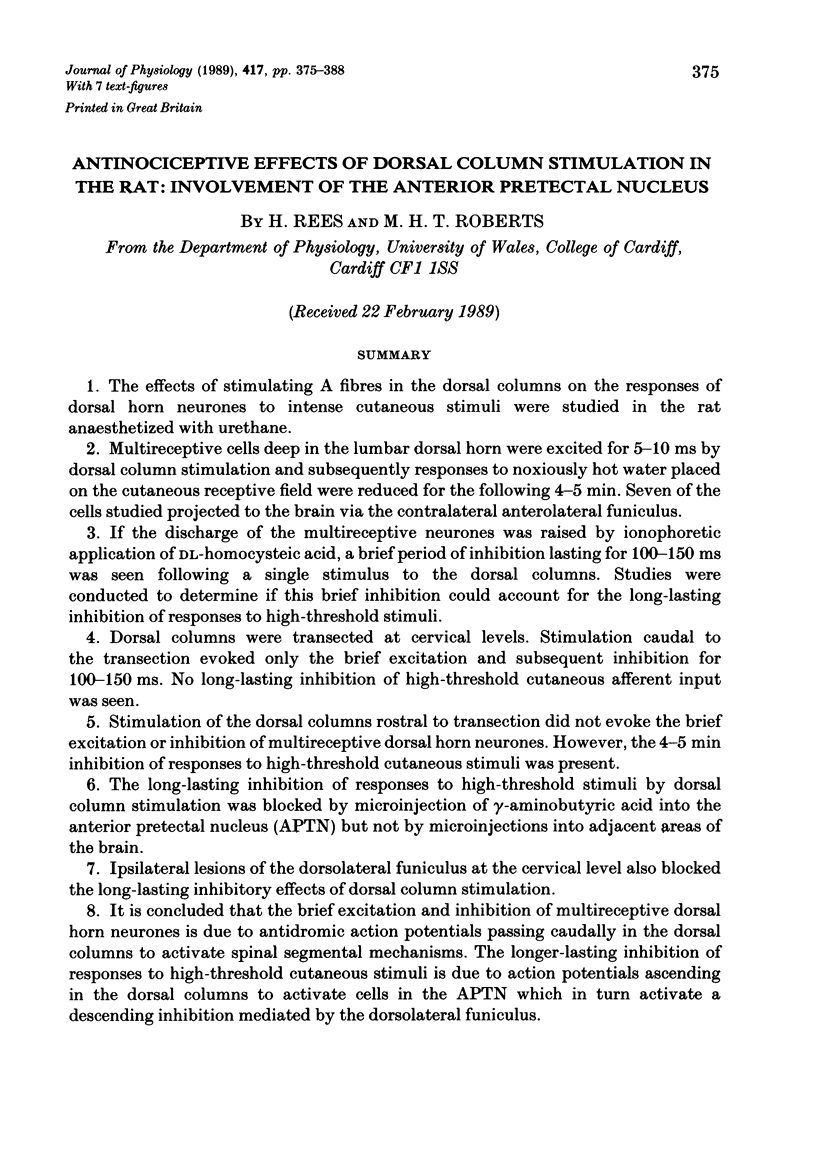
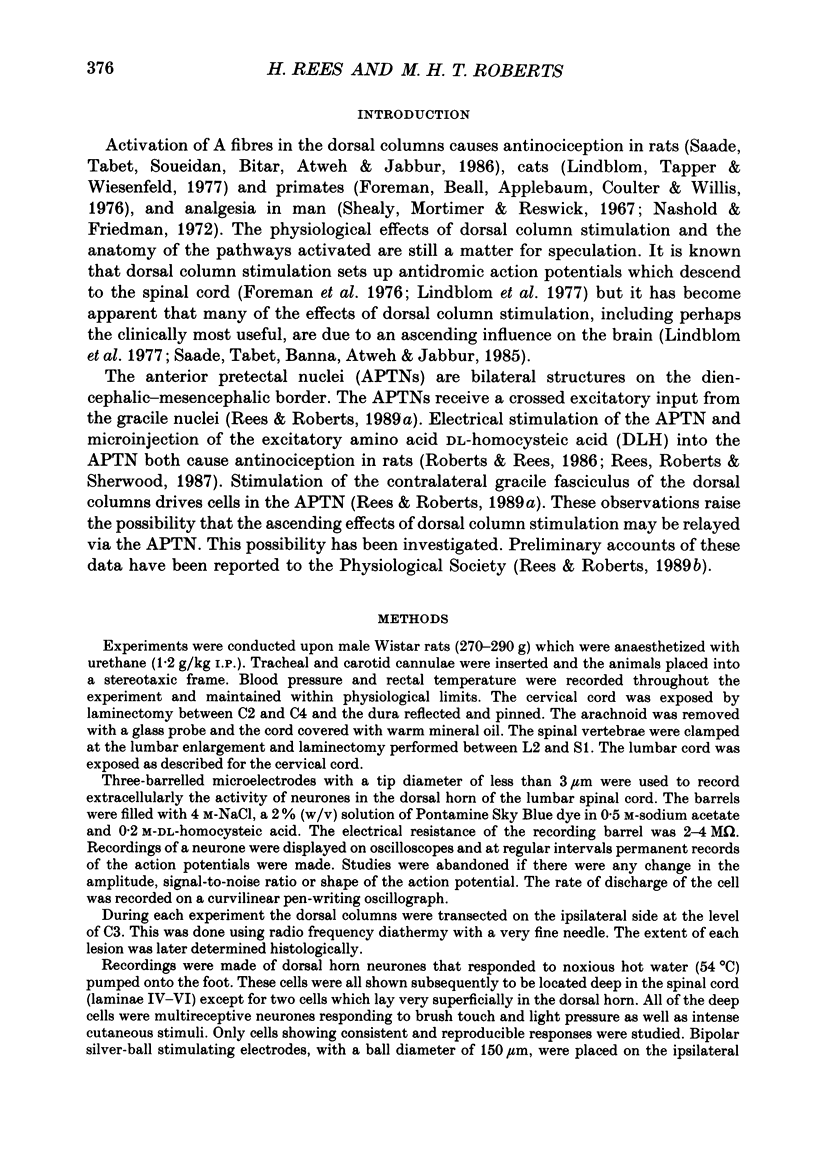
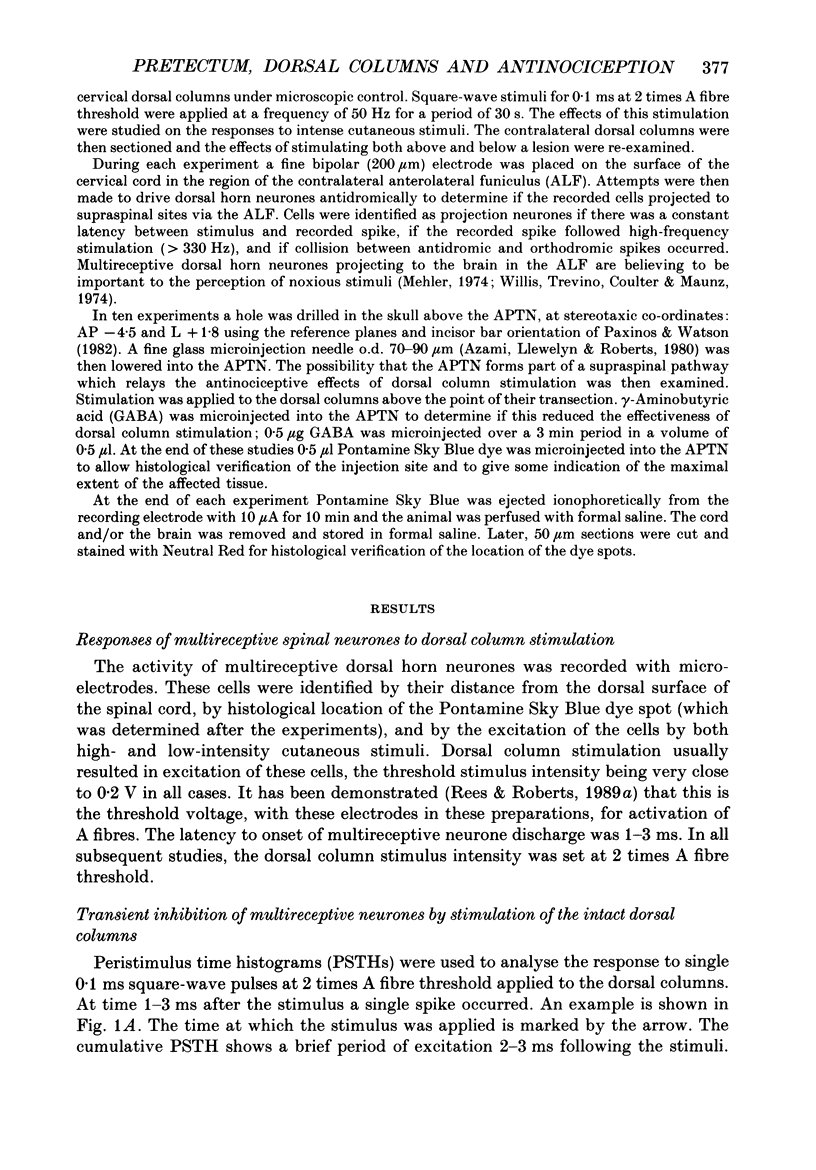
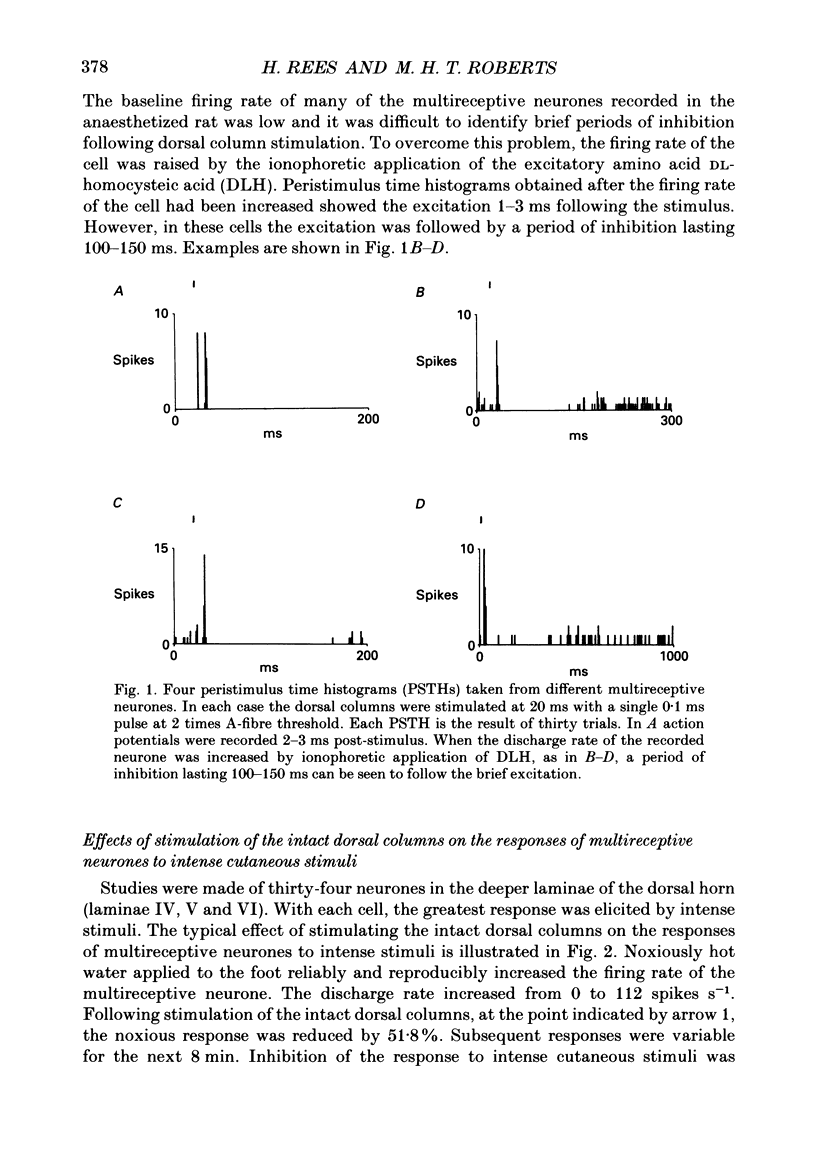
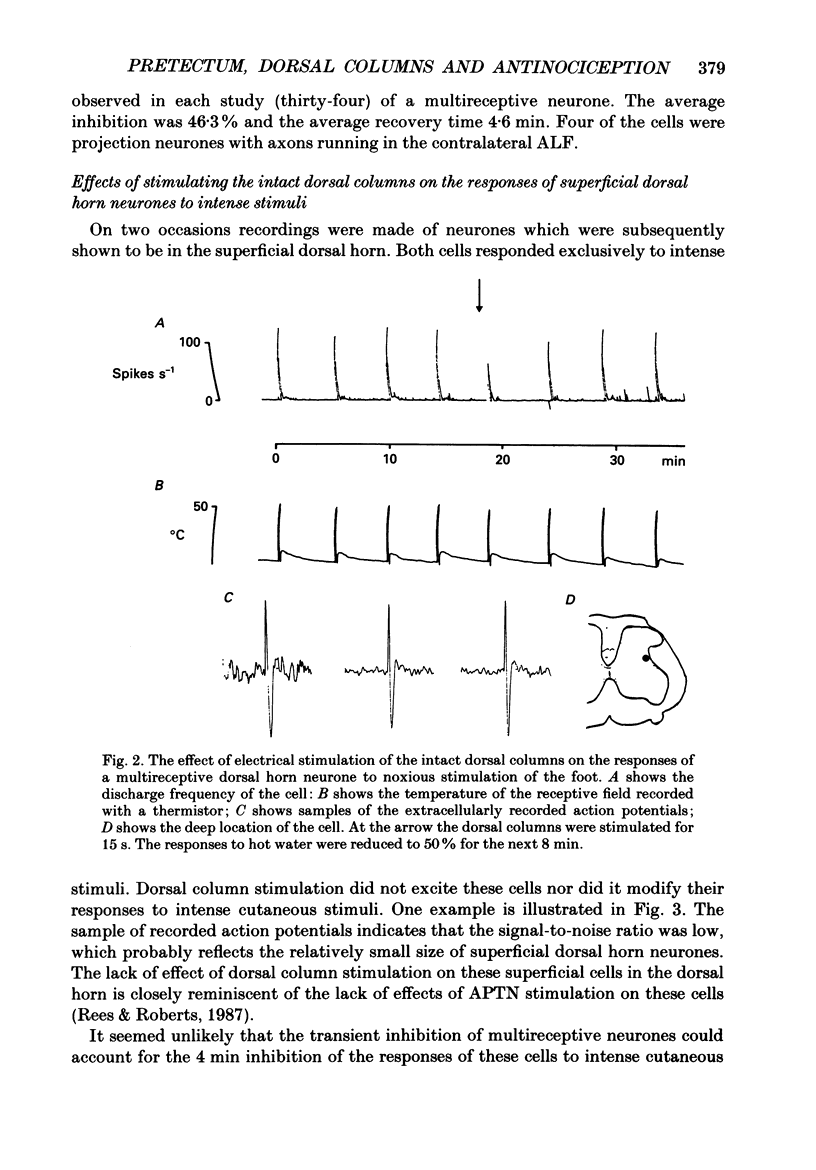
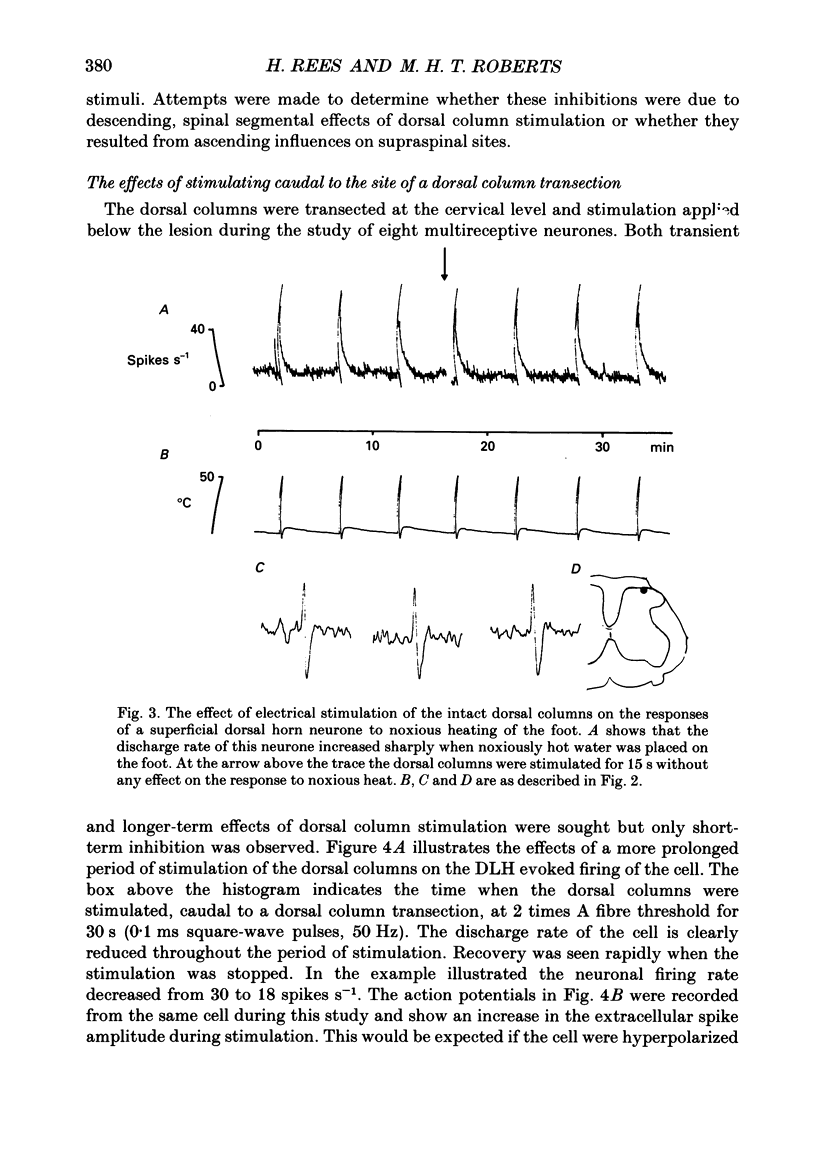
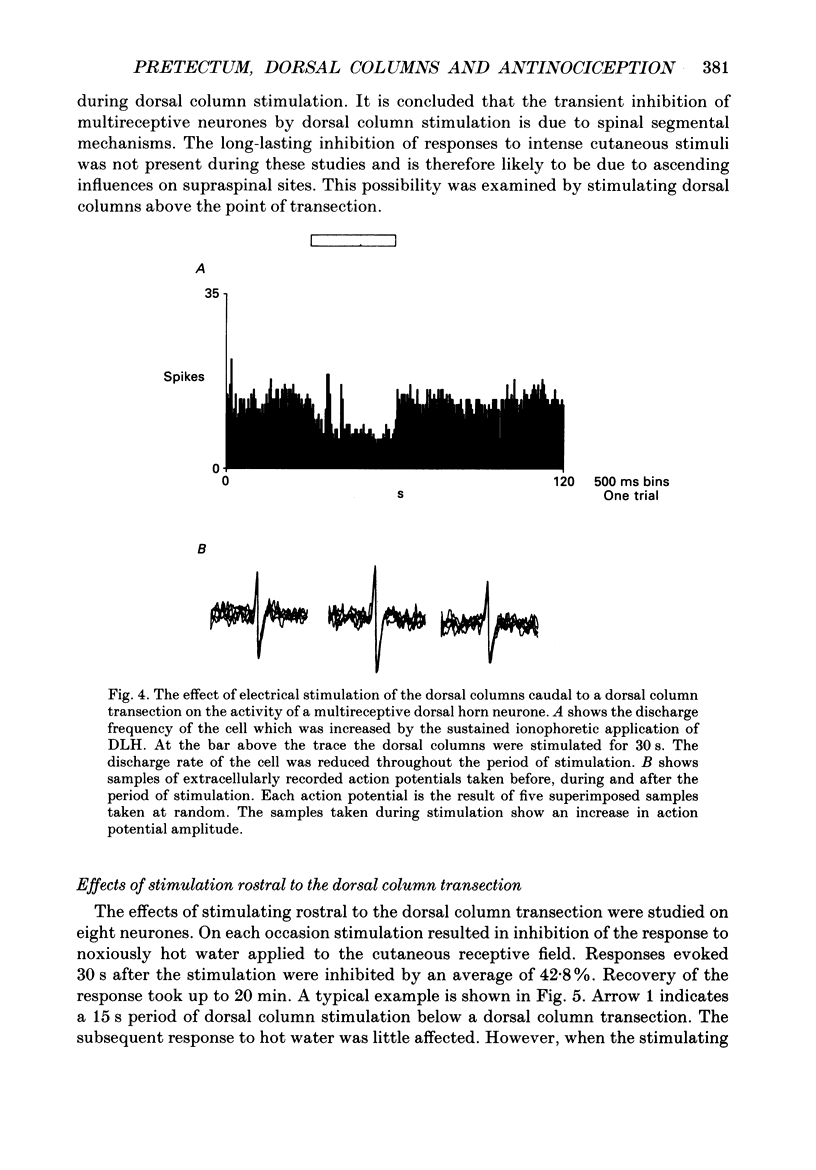
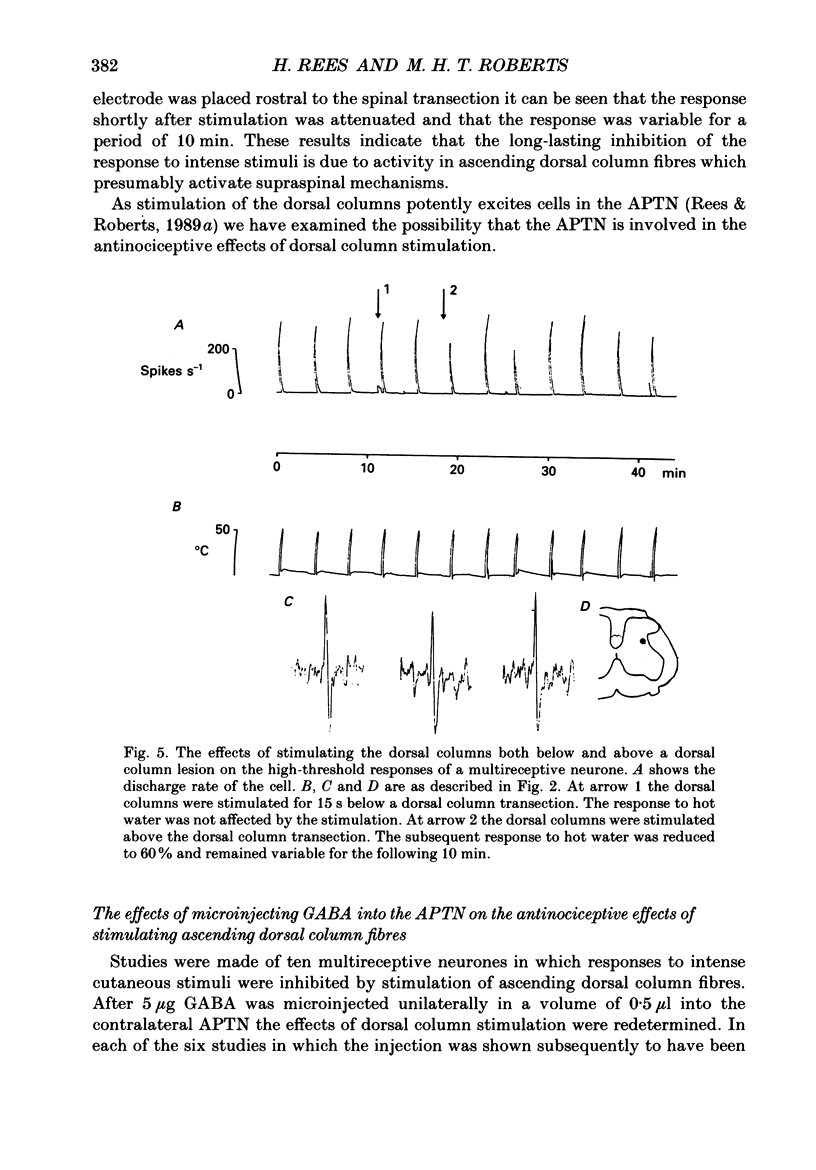
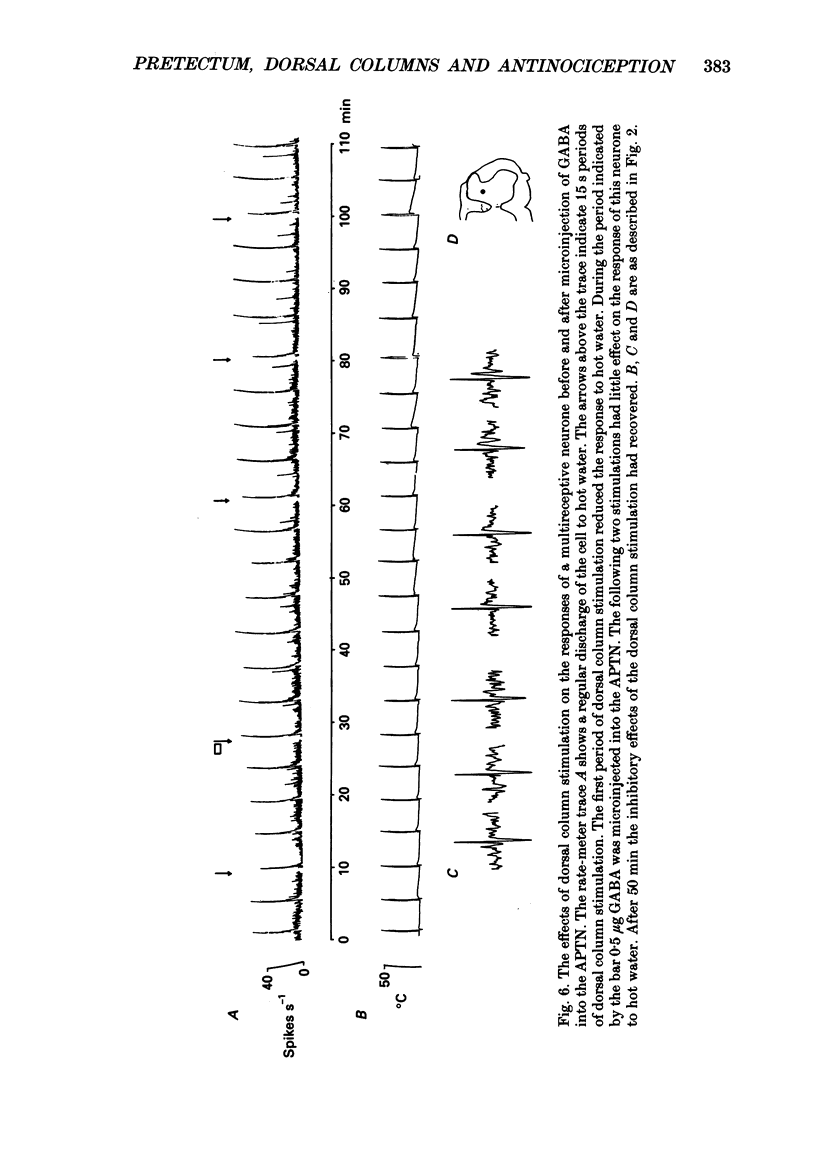
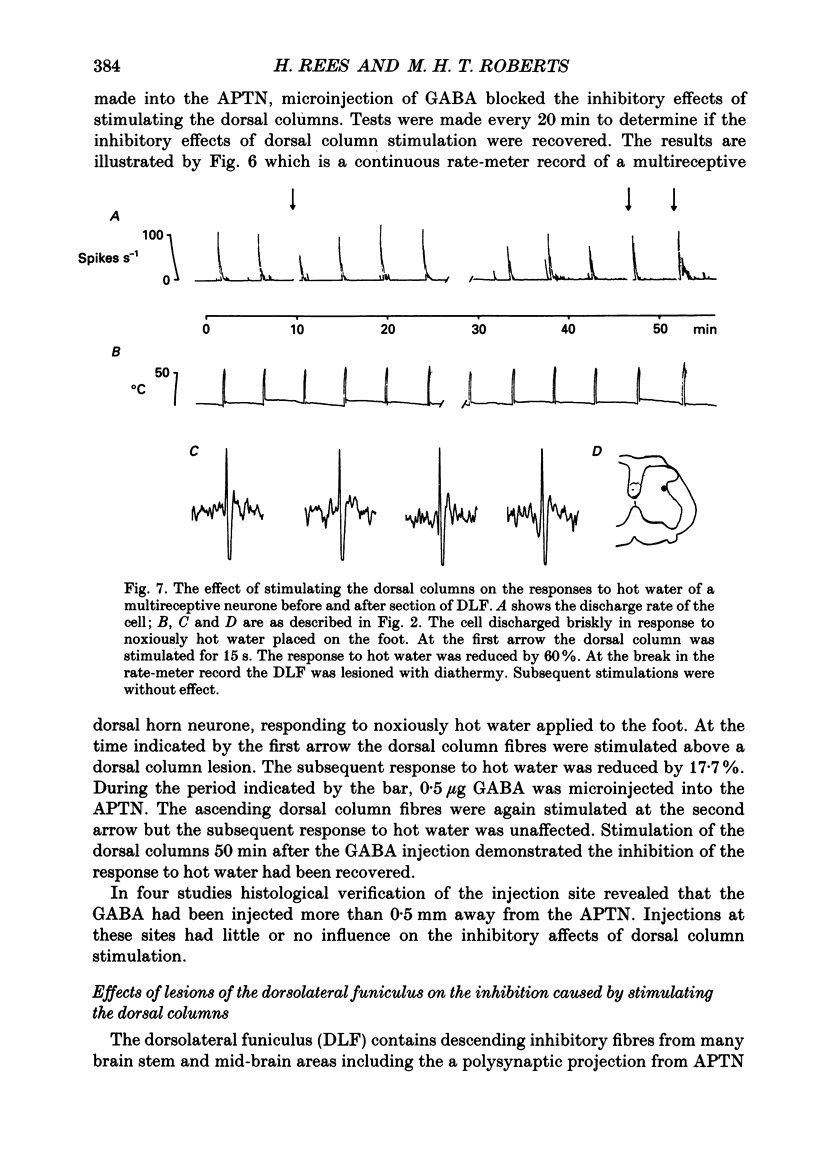
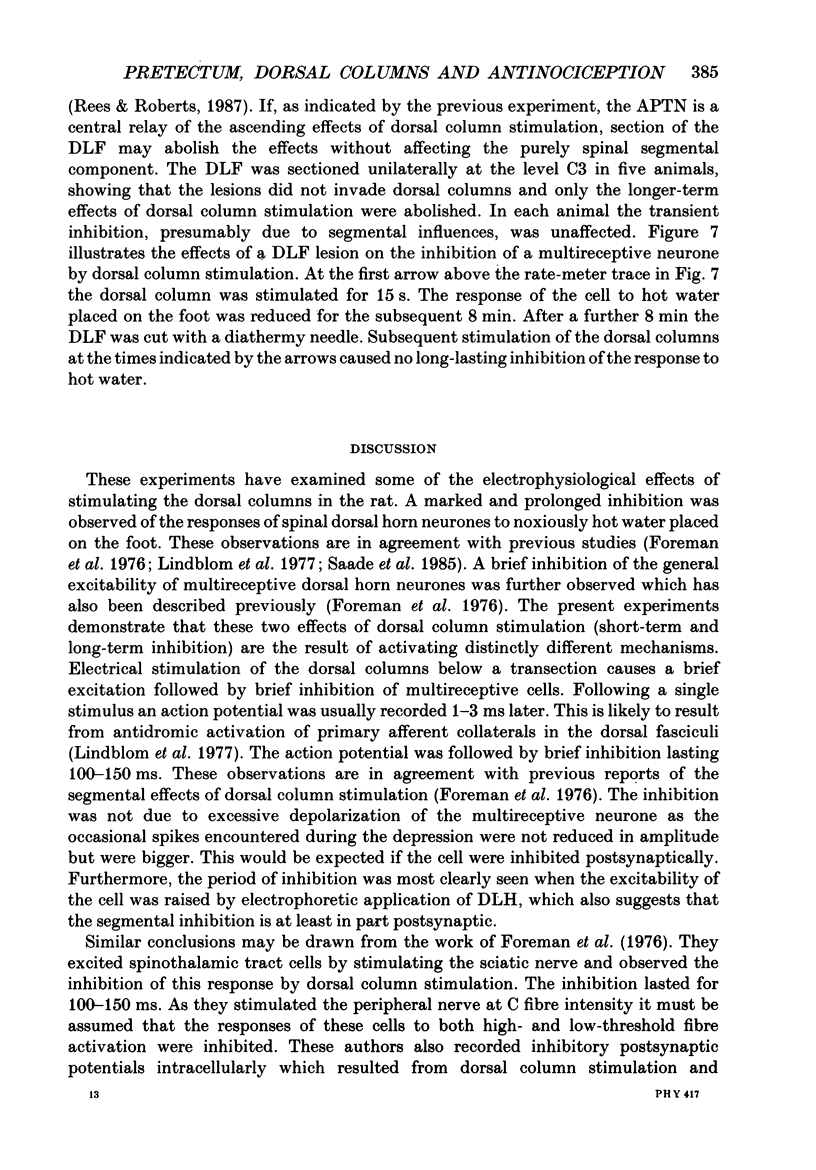
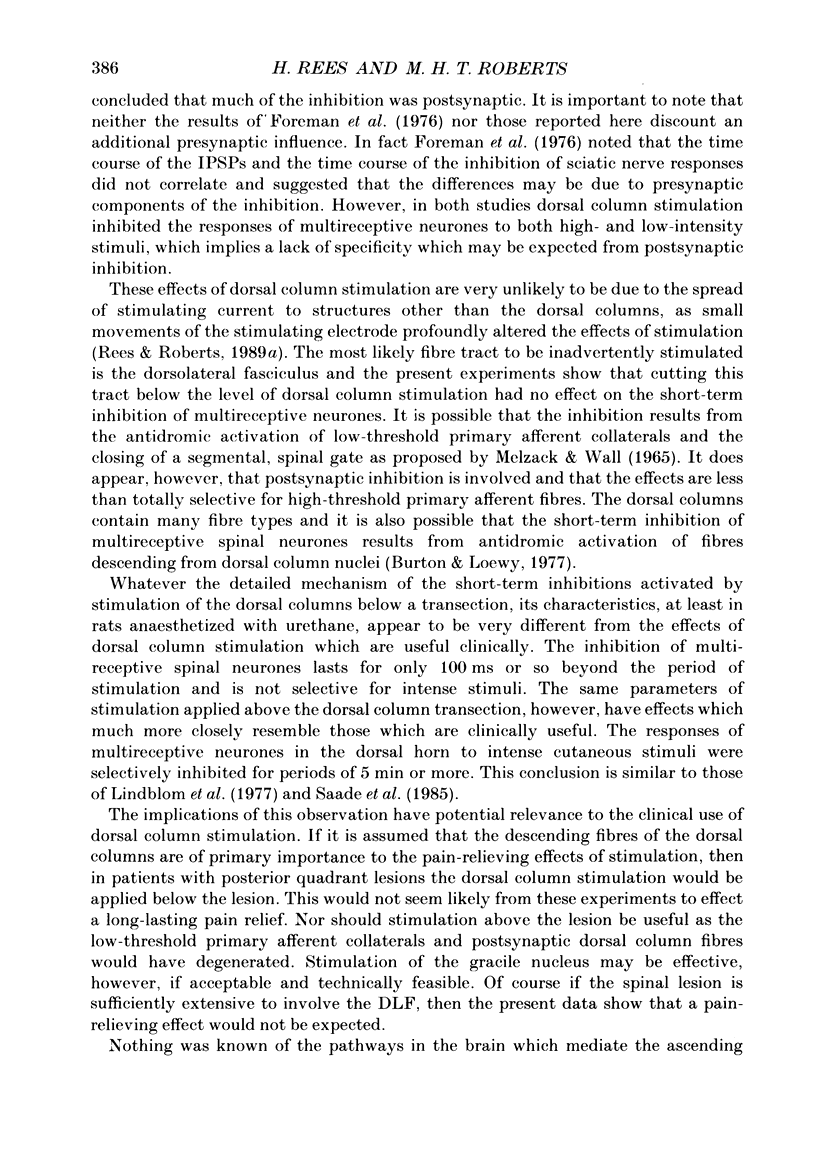
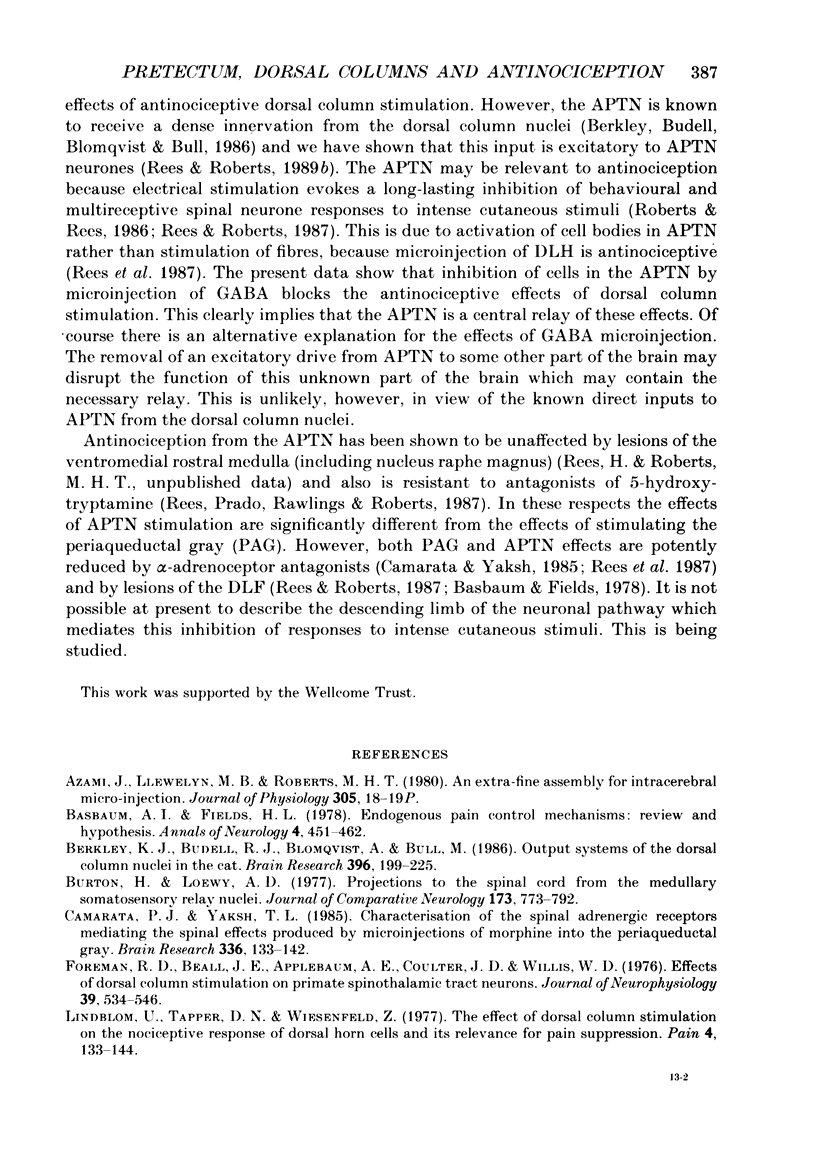
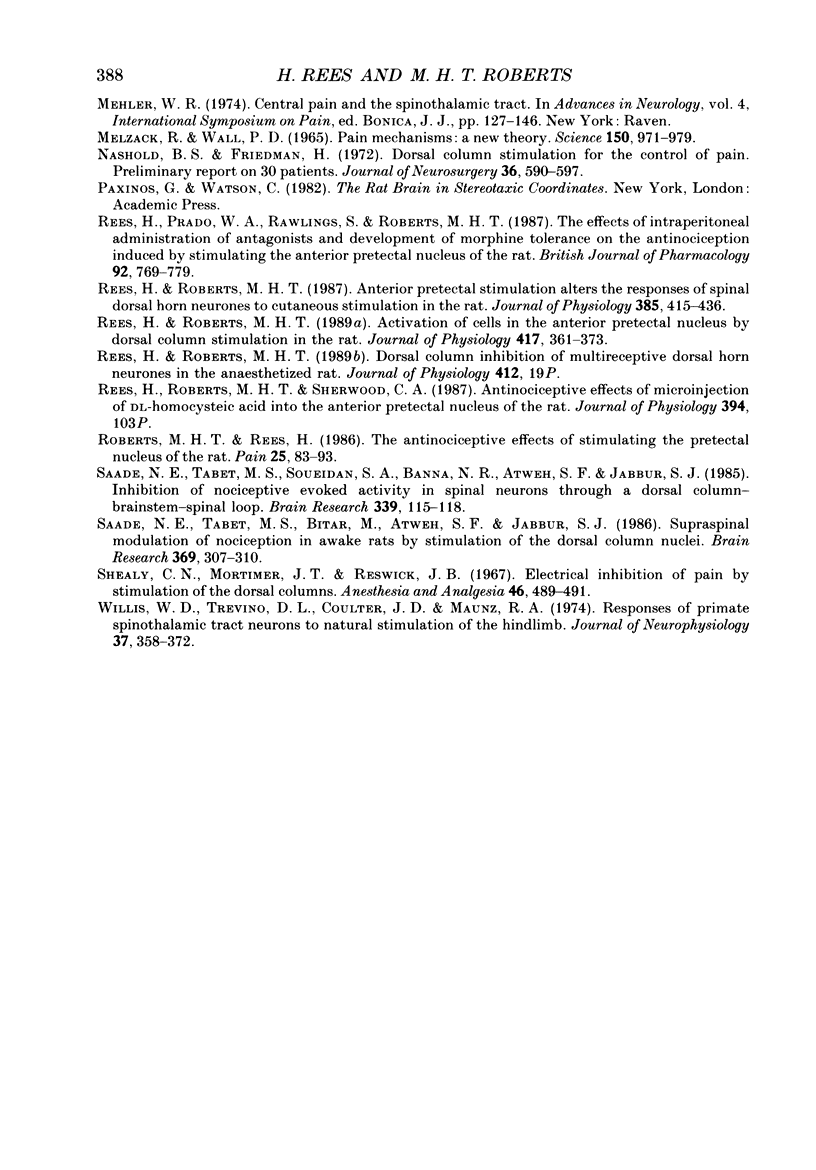
Selected References
These references are in PubMed. This may not be the complete list of references from this article.
- Basbaum A. I., Fields H. L. Endogenous pain control mechanisms: review and hypothesis. Ann Neurol. 1978 Nov;4(5):451–462. doi: 10.1002/ana.410040511. [DOI] [PubMed] [Google Scholar]
- Berkley K. J., Budell R. J., Blomqvist A., Bull M. Output systems of the dorsal column nuclei in the cat. Brain Res. 1986 Sep;396(3):199–225. doi: 10.1016/0165-0173(86)90012-3. [DOI] [PubMed] [Google Scholar]
- Burton H., Loewy A. D. Projections to the spinal cord from medullary somatosensory relay nuclei. J Comp Neurol. 1977 Jun 15;173(4):773–792. doi: 10.1002/cne.901730408. [DOI] [PubMed] [Google Scholar]
- Camarata P. J., Yaksh T. L. Characterization of the spinal adrenergic receptors mediating the spinal effects produced by the microinjection of morphine into the periaqueductal gray. Brain Res. 1985 Jun 10;336(1):133–142. doi: 10.1016/0006-8993(85)90424-x. [DOI] [PubMed] [Google Scholar]
- Foreman R. D., Beall J. E., Coulter J. D., Willis W. D. Effects of dorsal column stimulation on primate spinothalamic tract neurons. J Neurophysiol. 1976 May;39(3):534–546. doi: 10.1152/jn.1976.39.3.534. [DOI] [PubMed] [Google Scholar]
- Lindblom U., Tapper D. N., Wiesenfeld Z. The effect of dorsal column stimulation on the nociceptive response of dorsal horn cells and its relevance for pain suppression. Pain. 1977 Dec;4(2):133–144. doi: 10.1016/0304-3959(77)90127-0. [DOI] [PubMed] [Google Scholar]
- Melzack R., Wall P. D. Pain mechanisms: a new theory. Science. 1965 Nov 19;150(3699):971–979. doi: 10.1126/science.150.3699.971. [DOI] [PubMed] [Google Scholar]
- Nashold B. S., Jr, Friedman H. Dorsal column stimulation for control of pain. Preliminary report on 30 patients. J Neurosurg. 1972 May;36(5):590–597. doi: 10.3171/jns.1972.36.5.0590. [DOI] [PubMed] [Google Scholar]
- Rees H., Prado W. A., Rawlings S., Roberts M. H. The effects of intraperitoneal administration of antagonists and development of morphine tolerance on the antinociception induced by stimulating the anterior pretectal nucleus of the rat. Br J Pharmacol. 1987 Dec;92(4):769–779. doi: 10.1111/j.1476-5381.1987.tb11380.x. [DOI] [PMC free article] [PubMed] [Google Scholar]
- Rees H., Roberts M. H. Activation of cells in the anterior pretectal nucleus by dorsal column stimulation in the rat. J Physiol. 1989 Oct;417:361–373. doi: 10.1113/jphysiol.1989.sp017806. [DOI] [PMC free article] [PubMed] [Google Scholar]
- Rees H., Roberts M. H. Anterior pretectal stimulation alters the responses of spinal dorsal horn neurones to cutaneous stimulation in the rat. J Physiol. 1987 Apr;385:415–436. doi: 10.1113/jphysiol.1987.sp016499. [DOI] [PMC free article] [PubMed] [Google Scholar]
- Roberts M. H., Rees H. The antinociceptive effects of stimulating the pretectal nucleus of the rat. Pain. 1986 Apr;25(1):83–93. doi: 10.1016/0304-3959(86)90011-4. [DOI] [PubMed] [Google Scholar]
- Saadé N. E., Tabet M. S., Banna N. R., Atweh S. F., Jabbur S. J. Inhibition of nociceptive evoked activity in spinal neurons through a dorsal column-brainstem-spinal loop. Brain Res. 1985 Jul 22;339(1):115–118. doi: 10.1016/0006-8993(85)90627-4. [DOI] [PubMed] [Google Scholar]
- Saadé N. E., Tabet M. S., Soueidan S. A., Bitar M., Atweh S. F., Jabbur S. J. Supraspinal modulation of nociception in awake rats by stimulation of the dorsal column nuclei. Brain Res. 1986 Mar 26;369(1-2):307–310. doi: 10.1016/0006-8993(86)90540-8. [DOI] [PubMed] [Google Scholar]
- Shealy C. N., Mortimer J. T., Reswick J. B. Electrical inhibition of pain by stimulation of the dorsal columns: preliminary clinical report. Anesth Analg. 1967 Jul-Aug;46(4):489–491. [PubMed] [Google Scholar]
- Willis W. D., Trevino D. L., Coulter J. D., Maunz R. A. Responses of primate spinothalamic tract neurons to natural stimulation of hindlimb. J Neurophysiol. 1974 Mar;37(2):358–372. doi: 10.1152/jn.1974.37.2.358. [DOI] [PubMed] [Google Scholar]


